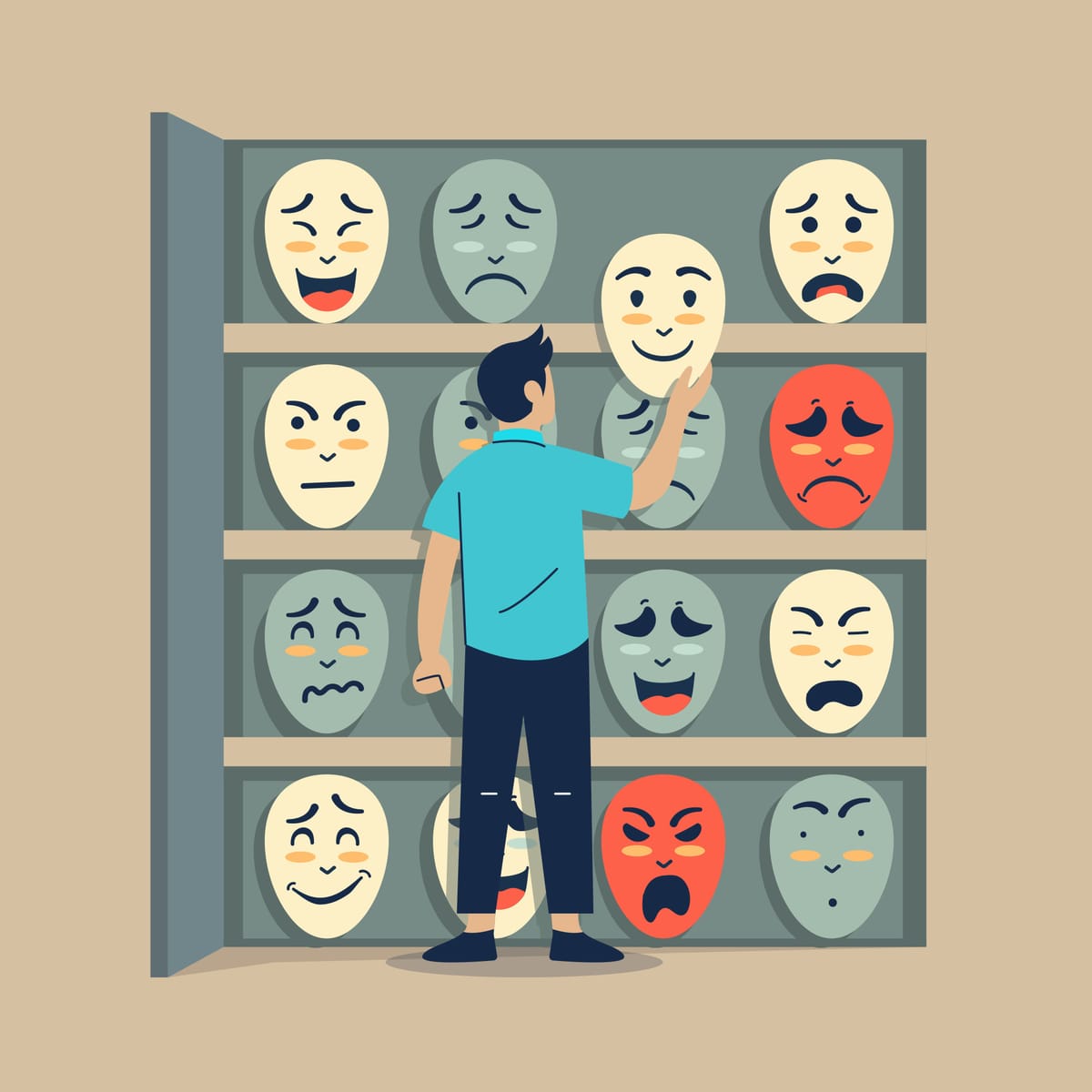Beyond the Title: Finding Identity After Walking Away
One moment, I was an executive leader. The next, I was locked out of my email. That was fast. Ok, now what?

It started slowly, years before I ever walked away. There had been a subtle gnawing—a feeling just beneath the surface.
Like many, the pandemic gave me time for reflection.
What am I doing? What do I want? Who am I beyond my work?
I had spent years building a career, growing into leadership, and taking on new responsibilities. My identity—at least a large part of it—was caught up in what I did.
But over time, I realized that my work, my title, and even my reputation weren't necessarily tied to who I was. More importantly, they weren't tied to who I was becoming.
It was my wife who first pointed it out. She saw what I couldn't—or wouldn't—see myself. My obsession with work. My drive to please others, my bosses, my colleagues—to my own detriment.
As a longtime student of religion and philosophy, now I was digging deeper. My upbringing, mixed with mindfulness, meditation, and Stoicism—in particular—had begun helping me detach my sense of self from my job.
But that left an uncomfortable question:
If I'm not what I do, then who am I?
The Decision to Walk Away
Fast-forward to mid-2024, when my boss told me that layoffs were coming—10% of the organization's salary budget (including my team) needed to be cut.
This wasn't my first time having had this conversation, so I knew the drill.
Who would I choose to let go? How many people would be needed to meet the required number? This was 100% my decision.
Yet not long after he told me, I knew.
It's time for me to go.
When that thought settled in, I felt an overwhelming sense of calm. This was the best thing for me, the team, and the company.
It was the right thing to do at the right time for the right reason.
I didn't say it out loud at first—not even to my wife. I wanted to sit with the thought, do the numbers, consider all angles, and be sure.
Within 24 hours, I was convinced beyond any reasonable doubt. My wife's support and encouragement sealed the deal.
The next day, I went into my boss's office and told him: Let me be the one to go. Keep my team intact. Let them continue the work we built together. It's time for me to step away.
After 20 years, it was time to leave.
The False Identity in Work
I've reinvented myself more than once in my career at this company.
I started as an outside consultant—the Mac guy. Then, after I was hired, I soon became the Help Desk Manager, then Operations Manager, then VP of IT, and finally Global Head of IT.
Each promotion came with a quiet doubt.
- Will my team accept me?
- Will leadership respect me?
- Am I really qualified?
- Am I the right person?
The higher you move up, the more the lines between who you are and what the role requires blur. I had become the Global Head of IT, which was my intention. I was capable, but wasn't fully aware of the changes and growth it would require.
I've often compared it to putting on a new suit. At first, it doesn't fit quite right. It feels stiff and unnatural. But you wear it enough, and over time, you adjust. You convince yourself that this is just who you are now.
Until one day, you realize you no longer know what's underneath.
What Happens When the Title Is Gone?
One moment, I was an executive leader.
The next, I was locked out of my email.
That's the first thing that happened. After the exit interview with HR, I returned to my office, only to realize—my computer was already gone.
Ironic, really.
I was the Global Head of IT, responsible for overseeing all company technology, security, access, and infrastructure.
And in an instant, my own access was revoked. My own team had taken my computer. Of course, they were just doing their jobs. But, I had to laugh.
One moment, you're an integral part of the system; the next, you're erased from it.
Then, the chat messages stop. No emails. No meeting invites. No updates.
It should have been a relief—and in some ways, it was—but it was also jarring. For the first time in 20 years, I wasn't in the loop.
Quickly, I realized how much time was spent checking, responding, managing, leading.
And now? Silence.
I won't lie—there was an odd sense of loss in that. I had spent years leading teams, managing projects, and being in the know. Now? It felt like the world had moved on without me. And it had.
Rebuilding Identity: Who Are You, Really?
The process of detaching my identity from my job didn't happen overnight.
It had been building for years—through reading, reflection, long conversations, and small but intentional shifts in how I saw myself. I had been working on it in the background, like a slow-burning realization.
But like most things, there comes a tipping point.
A moment when all your worlds collide, and you realize—this can't continue.
For me, that moment came at the end of 2023.
Mom passed away in November, and suddenly, everything I had been wrestling with—the questions about who I was, what truly mattered, and whether I was living the life I actually wanted—came crashing in. I had been circling around these questions for years, but they weren't abstract anymore. They were urgent.
I couldn't ignore them any longer.
I hit a dark period. I nearly quit my job then. I even wrote a resignation letter in January 2024. But instead of quitting, I went for help. Eventually, I hired a therapist and coach.
And that decision changed everything.
He helped me see something critical: I wasn't just one identity.
My job (work self) wasn't the only version of me. There were many other parts—my personal self, my creative self, my critical self, my curious self, and my "figure it all out" self, to name a few.
After a few months, the work we were doing started making sense. The realization that we all have different "parts" of ourselves that show up in various contexts. My "work self" had taken over for so long that I barely recognized the other versions of me.
The goal wasn't just to "move on" from work. The goal was to bring my "true self" forward in every area of my life. To find balance and peace with all of my parts.
Leaving the job wasn't the most important thing any longer. I needed to step into a completely different way of living.
What I've Learned (And What I'd Tell You)
- By 40, you've lived enough to see the patterns in your life. Use that awareness to strengthen your true self earlier in life. Regardless, it's never too late.
- Don't wait until the job ends to figure out who you are. If you only see yourself as your work, losing it will feel like losing yourself.
- If you're struggling with identity, get help. It's not a weakness. It's wisdom.
- If you're in a career where your job defines you, make time to separate your identity from your work. You are more than your title, job, and email signature.
Not everyone has the luxury of stepping away from work like I did. But everyone has the ability—and the responsibility—to build an identity that isn't defined by their organization, job, or paycheck.
Because one day, the title disappears. And when it does—who's left?
Where I Am Today
Learning who I was didn't end when I walked away—it was just beginning. I'm still working with my therapist and coach, making friends with new parts of myself, and pursuing passion projects I've put off for years. You see the fruits of that work here and in my podcast.
My former colleagues still reach out—sometimes for advice, sometimes just to connect. When you work alongside people for hours each day over many years, these relationships matter. We stood shoulder to shoulder, making the seemingly impossible possible for our organization. They are forever allies.
In an unexpected turn, the company went bankrupt recently, just six months after I left. No crystal ball could have predicted it, and no one wishes that outcome on anyone. My talented team has mostly moved on—some within the same industry, others venturing into new territories like myself. They will all be successful.
Recently, I partnered with my good friend's business to help develop and build new growth channels. I'm back in the game, but on my terms—20-25 hours a week of contract work. I'm no longer a "boss" per se, but I hope to bring additional leadership and vision to the team. Once again, I'm trying on a new suit, bringing a different set of skills and mindset to this next chapter.
I miss some of the structure I had before, but I don't miss the endless meetings, emails, vendor calls, and invoices that drained so much of my life. I'm more present with my wife and family, more connected to what truly matters.
I'm stronger but still learning—as I expect I always will and should be.
Afterword: In this post, I mention my "dark period". It's important to acknowledge the mental health aspect and not brush over it.
If you are struggling with depression, anxiety, loss, grief, being laid off, life changes or the myriad of others things that can cause you to feel life is spiraling... please reach out and get help. I've been there and I know it's not easy. It's hard to know where to turn.
A trusted friend is a great place to start, but if you've hit that "dark period", please go to a doctor, urgent care, or even emergency room. They will help you.
Also, you can call or text 988, the national hotline for mental health crises and suicide prevention.You can call 988 24/7 by phone, text, or online chat.




